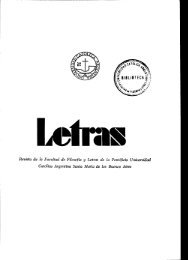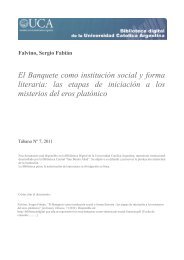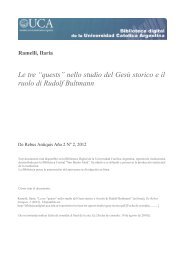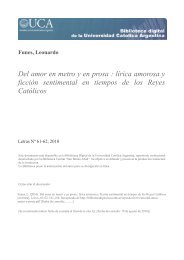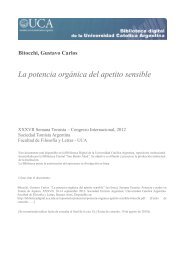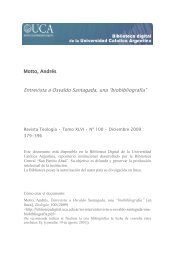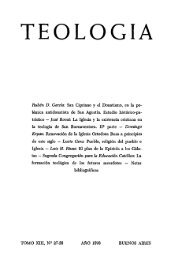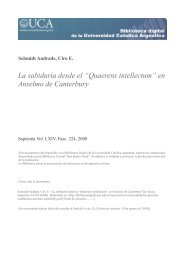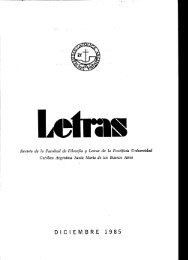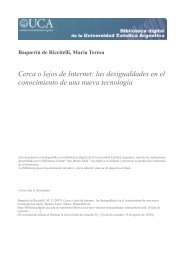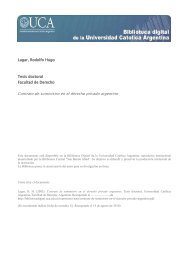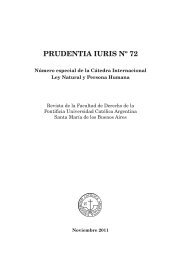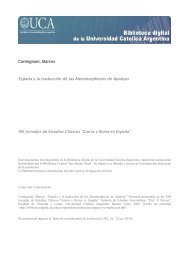Letra - Biblioteca Digital - Universidad Católica Argentina
Letra - Biblioteca Digital - Universidad Católica Argentina
Letra - Biblioteca Digital - Universidad Católica Argentina
You also want an ePaper? Increase the reach of your titles
YUMPU automatically turns print PDFs into web optimized ePapers that Google loves.
El hombre podía conversar con Dios en el Paraíso; era aún puro e inocente.<br />
Pero con la Caída llegó el Silencio. La Redención hizo posible retomar el<br />
diálogo con la Divinidad, pero el hombres no puede lograrlo sino hasta que<br />
haya restaurado la Divina Imagen en sí mismo.<br />
...he now<br />
Did there repair<br />
Such losses as befell him in this air.<br />
(...él ahora<br />
Allí reparó<br />
Las pérdidas sufridas en esta atmósfera).<br />
Traherne cree, con Milton, que al Hombre le fue dado no sólo un Paraíso<br />
sino también una fuerza creadora que nunca perdió. Al comienzo de su Poema,<br />
Milton invoca su Espíritu para que lo asista en su tarea (A la manera de la<br />
Musa Homérica, P.P., 1.19-20). Este Espíritu ayudará al hombre a recobrar su<br />
juventud "youth" y belleza "fairness" (palabras que también expresan equidad,<br />
justicia) y lo conducirá hacia arriba "aboye where light, joy, leisure, and trae<br />
Coinforts ~ve", donde luz, alegría, placeres y verdaderos Consuelos se mueven.<br />
Así como Vaughan buscó y encontró pruebas de la regeneración humana<br />
en la naturaleza, también Traherne y Milton más tarde. Ambos alabaron a la<br />
naturaleza como el regalo más precioso dado al hombre y como evidencia de<br />
la infinita bondad de Dios. Puede oírse la voz gozosa de Traherne cuando<br />
exclama:<br />
What could I, 0 my Lord,-: desire more than such a wOrld!<br />
Such Heavens and such an Earth!... O what praises shall<br />
I return unto there, the wisdom of the Father, and the<br />
brightness of the glory of his Eternal Goodness!<br />
(T he Centuries, 1.64)<br />
(Qué podría yo, Oh mi Señor, desear más que tal mundo!. Tal<br />
Cielo y tal Tierra! Oh, qué alabanzas elevaré hacia Ti,<br />
la sabiduría del Padre, y el esplendor de la gloria de<br />
su Eterna Bondad!).<br />
y la canción de Milton donde la gozosa exaltación es controlada por la enseñanza<br />
moral de las últimas dos líneas:<br />
Thrice happy Men,<br />
And sons of Men! Whom God hath thus advanced,<br />
Created in his image, there to dwell<br />
And worship him and in reward to rule<br />
Over his works on earth, in sea, or air<br />
And multiply a cace of worshippers<br />
Holy and just; thrice happy, if they know<br />
Their happiness and persevere upright! (P.L., 7.625/632)<br />
-- 19 —



